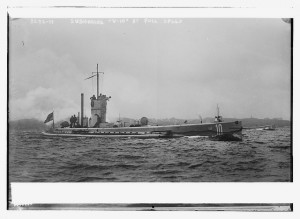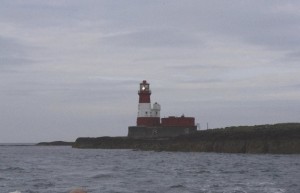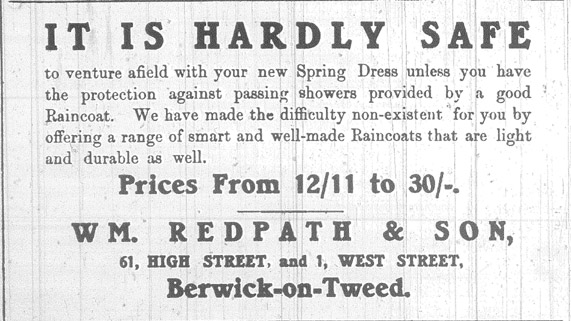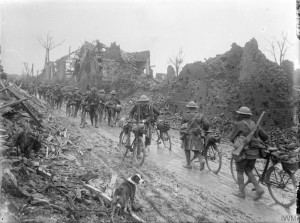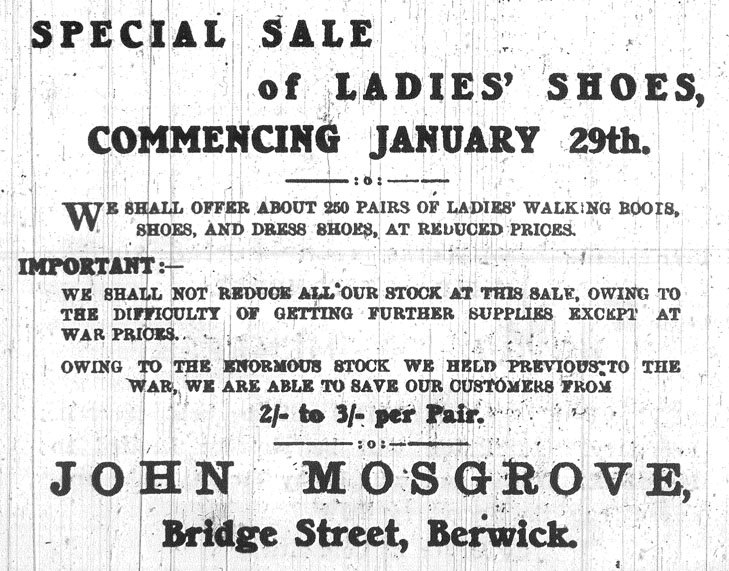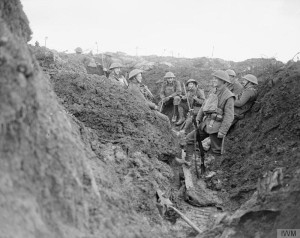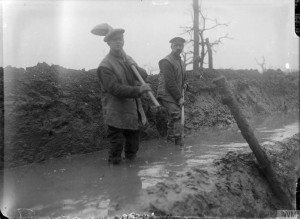BERWICK ADVERTISER, 15 OCTOBER 1915
BAMBURGH
Wedding of Miss Weatherston and Gunner E. Littlefair – On Saturday last a very pretty wedding took place at St. Aidan’s Church, Bamburgh. The contracting parties were Eleanor, eldest daughter of Mr H. Weatherston of Bamburgh, and Gunner E. Littlefair, eldest son of Mr and Mrs Littlefair of Bamburgh. A choral service, officiated by the vicar (the Rev. E. Williams), assisted by the Rev. F. Long of Lucker, was held. The bride was dressed in white shantung silk, veil, and wreath of orange blossom. Miss S. Weatherston, sister of the bride, and Miss Littlefair, sister of the bridegroom, acted as bridesmaids, and the Misses Campbell, Newcastle, as attendants. The bridesmaids wore dresses of blue silk poplin and fawn felt hats and the attendants wore dresses of white net lace and little mob caps. The bride carried a bouquet of white heather, and the attendants each carried a basket of sweet peas. Sapper P. Littlefair, brother of the bridegroom, acted as best man.
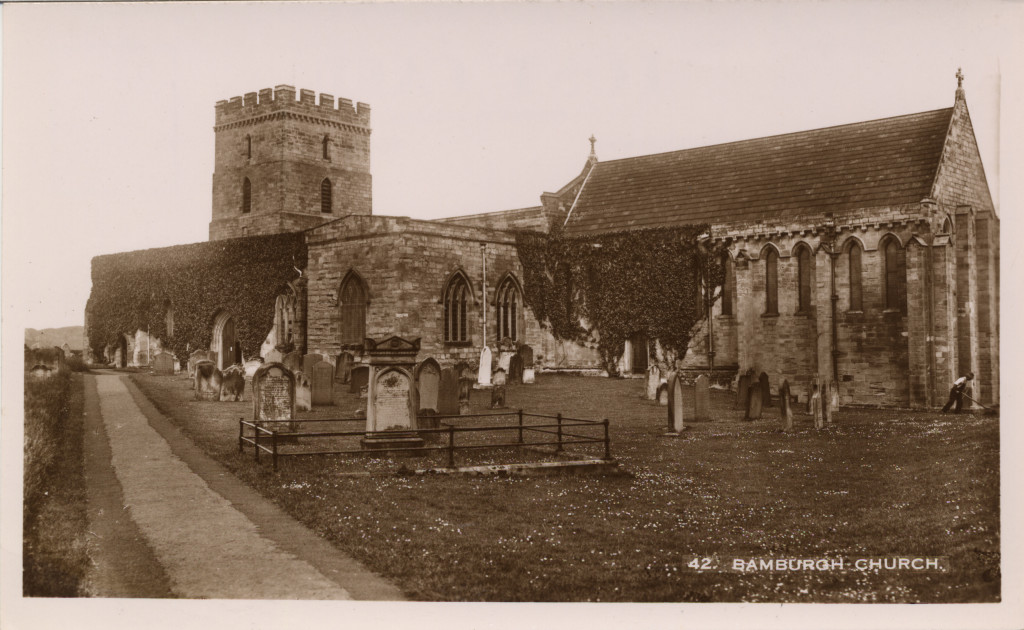
The bride was given away by her father. A guard of honour was formed by men from the Northern Cyclist Battalion and Sea Scouts. After the ceremony a reception was held at the Lord Crewe Arms Hotel where an excellent tea was provided by the Misses Morpeth, and there were many friends of the bride and bridegroom present. The Vicar made a very interesting speech, as did also the schoolmaster (Mr T.W.Little) and various toasts were given, to which the bride and bridegroom suitably responded. Later in the day the happy couple left for Edinburgh where the honeymoon was spent. The bride’s travelling costume was blue with black velvet hat. The presents were numerous and useful, and included some valuable articles. The bride’s gift to the bridegroom was a signet ring, and that of the bridegroom to the bride was a dressing case and furs. The bridegroom presented the bridesmaids with pendants.
BERWICK PETTY SESSIONS
A DISORDERLY HOUSE
Mary Jefferson, married woman, West Street, Berwick, was charged with allowing her premises to be used as a brothel on the 5th Oct. Defendant did not appear.
The Chief Constable said there had been considerable complaints about this woman.
P.C. Welsh said with P.C. Spiers he went to defendant’s house and found indecent behaviour going on in the house.
P.C. Spiers corroborated.
Defendant was sentenced to two months’ hard labour without the option of a fine.
DRUNK WHILE DRIVING CATTLE
George Scott Davis, plasterer, Berwick, was charged with being drunk and incapable while in charge of two bullocks belonging to Mr Foreman, butcher, Norham. Defendant pleaded not guilty.
P.C. Spiers said about 1.20 p.m. the previous day he saw defendant in Main Street, Tweedmouth, in charge of two bullocks. Defendant was very drunk. Witness got the bullocks penned and brought defendant to the Police Station.
P.C. Smith said defendant was very drunk when brought to the Police Station. Defendant was hardly able to look after himself without having charge of cattle.
Fined 5s or seven days.
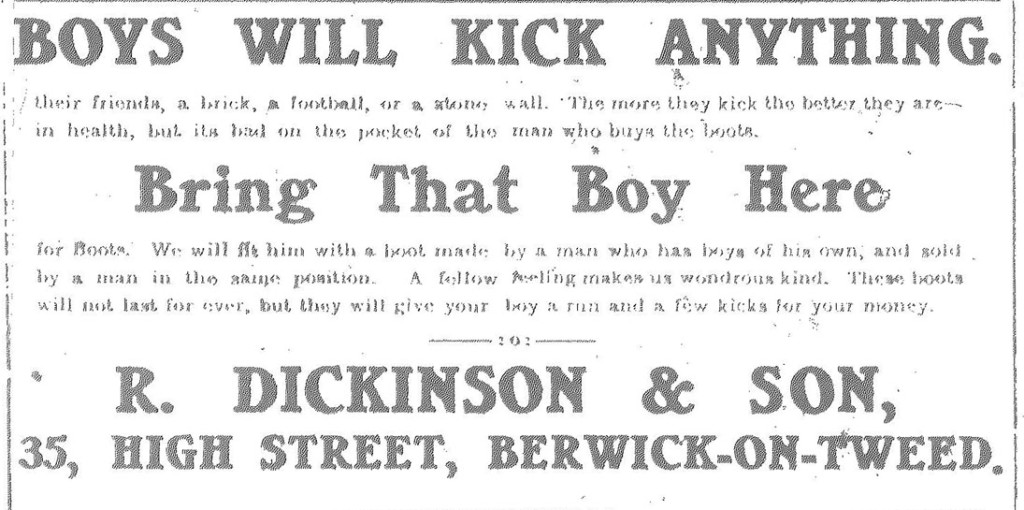
HOW GERMAN CHEMISTS RUIN THE HAIR
Specialist’s Startling Exposure
Gaudy labels and fancy bottles cannot beautify the hair and make it grow; yet, according to one of our greatest authorities on the care of the hair and scalp, there is very little else to recommend the German made hair tonics which are still being offered for sale in this country. Crude methylated spirit, dyes, colouring matter and perfume form the principal
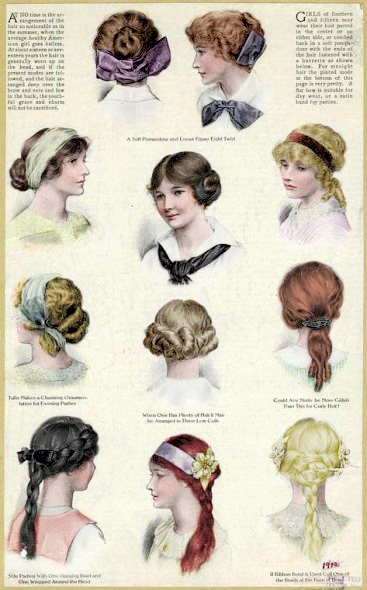
ingredients of most of these hair tonics, and the men and women who use them because they are cheap wonder why their hair turns grey, becomes dry and brittle and finally falls out. The reason is not hard to find. Surely, even if it costs just a trifle more it is better to obtain a British-made hair tonic. British chemists stake their reputation upon the quality of their products. As an instance there is Lavona Hair Tonic – a preparation which can be obtained locally from John Brown, 5 High Street, Berwick; F.R. Padley, Market Place, Wooler; and most other high class chemists everywhere. There is no need for secrecy regarding the composition of this excellent hair and scalp tonic. It is prepared from 3 ozs. Bay Rum, 1oz. Lavona de Compossee, ¼ drachm Menthol Chrystals, and a little perfume, and readers can, if they wish, obtain the necessary ingredients and make the tonic themselves. But the majority will prefer to obtain the complete Lavona Hair Tonic from the chemist, firstly because it is put up in special sprinkler topped bottles which economise the tonic, and secondly because with each bottle the chemist gives a signed guarantee that he will refund your money unless Lavona Hair Tonic actually makes your hair grow longer and more beautiful and eradicates scurf and dandruff from your scalp.


